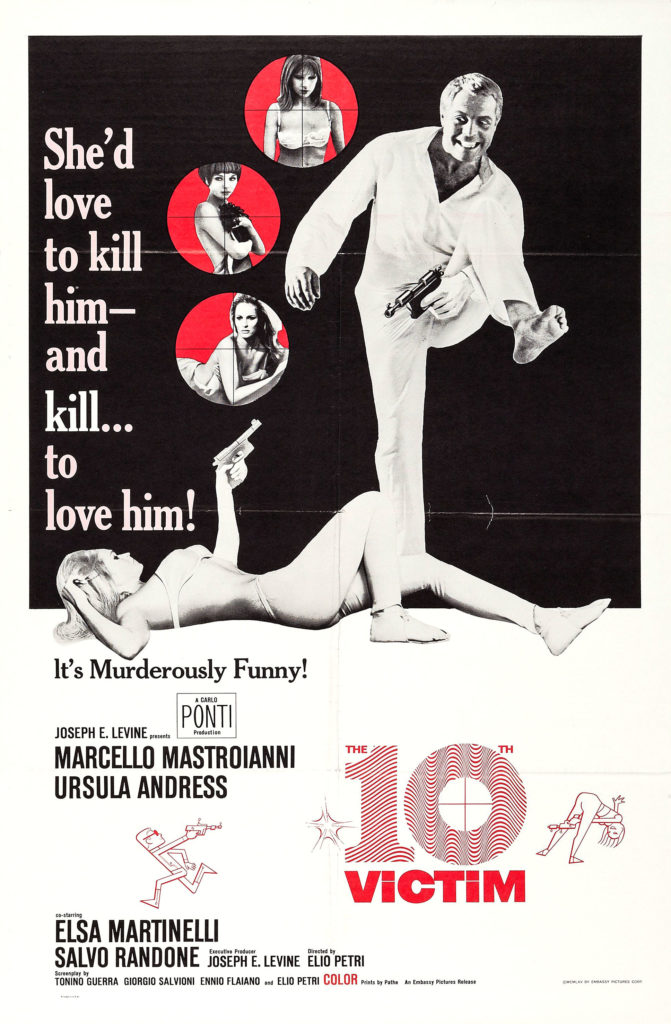The swinging ’60s have come to Missile Test, in the form of Italian/French production The 10th Victim. An absurdist bit of film whimsy from Italian director Elio Petri, The 10th Victim is notable for providing much of the inspiration for Mike Myers’s character Austin Powers. Indeed, one of the great gags in the first Austin Powers film, a bikini top that shoots bullets, was lifted from this film.
Based on the short story Seventh Victim by Robert Sheckley, and starring Ursula Andress as Caroline Meredith and famed Italian actor Marcello Mastroianni as Marcello Poletti, The 10th Victim pits the two main characters against each other as hunter and victim. That’s a literal interpretation, by the way. This is no romance with the idea of a hunt as allegory. Meredith is a hunter looking to kill her victim.
All the countries of the world have, in this film, managed to agree on one thing, and that is that people are impossible to control. They need an outlet. Society needs its people to have an outlet, or it risks collapse. Enter the Big Hunt, a contest sponsored by the nations of the world whereby contestants are pitted in death matches against each other. One a hunter, and one a victim. The hunter knows the identity and location of the victim, and must track them down. The victim only knows that they are being hunted, and must be on the lookout for their would-be killer.  After ten victories, five as a hunter and five as a victim, a contestant is declared ‘decaton,’ and wins a large cash prize of...one million dollars!
After ten victories, five as a hunter and five as a victim, a contestant is declared ‘decaton,’ and wins a large cash prize of...one million dollars!
Meredith has just won her ninth hunt, and will be a hunter for her tenth contest. A supercomputer in Geneva selects Poletti as her victim, and she is off to Rome. But, her potential rise to decaton has presented her with a sponsorship opportunity. Execs at the Ming Tea Company want her to kill her victim for a Ming Tea commercial. The plan is for her to put Poletti down, turn to the camera, and speak the product tagline. It’s wonderfully capitalist.
Poletti, for his part, is a super cool, rakish Italian. He has no time to be nervous about the hunt, and seems to care little for protecting himself. It’s all part of his plan, of course. He wants to lure his hunter out into the open, to make their identity known, and then he will deal with them. Of course, because Meredith has to lure Poletti to a specific location in order to kill him, she has to approach him in person. She does so, pretending to be a journalist who is infatuated with Poletti, and the two, as is de rigueur in a film such as this, strike up a love affair.
The aim of this film isn’t serious drama. Rather, it’s a black comedy, only not so much black as deep pink. Imagine if the Coen brothers were from Rome instead of Minnesota, and one begins to get an idea of this film’s style and intentions. For example, the gun violence is treated with no seriousness whatsoever. Those with guns barely bother to aim them, and those that get shot show no evidence of bullets penetrating their body other than falling to the ground. There’s no blood at all. All realistic violence would have done is undermine this movie, anyway. Lack of seriousness is as much a style in this film as the costumes the cast wear, the cars they drive, and the homes in which they live. It would all be very retro were this film not, in fact, from 1965.
The whimsical nature of the film nicely mocks the idea of serious treatments of its plot. Coming decades before Battle Royale, The Hunger Games, and The Purge, this film treats similar material properly. The idea of state-sanctioned murder as a form of entertainment in a post-Enlightenment world is insane, and can’t be taken seriously, no matter how many authors and filmmakers have tried.
The two leads play into the joke quite well. Mastroianni mastered a sly look, and was cooler than Mick Jagger in this film. Being in on the joke, his performance of laid back cool was so exaggerated that he was almost unconscious at times, but it fits. Andress was never they type of talent that Mastroianni was, but she measured up to the material.
The 10th Victim is a fun film. It goes on a little too long, as Petri passed on two perfect opportunities to end the film in favor of a squishy resolution. But then again, there’s no reason for a viewer to take this film any more seriously than the people who made it.
